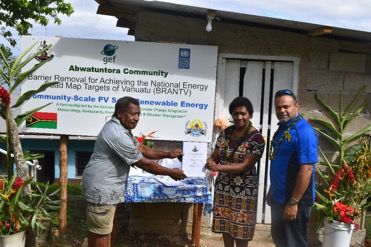
The people on North Pentecost had many reasons to smile on the 17th of July 2020.
It was the day that marked the official launching of their solar photovoltaic-powered community building, which houses their fisheries project on their island of Pentecost. This commemorates another milestone for PENAMA province and especially the community of Abwatuntora and Angoro on North Pentecost by having a reliable source of power for their health services and livelihoods in the productive sector.
With support from the Global Environment Facility (GEF) and the United Nations Development Programme (UNDP), the Department of Energy (DoE) through the Barrier Removal for Achieving the National Energy Roadmap Targets of Vanuatu (BRANTV) project is currently demonstrating renewable energy (RE) off-grid systems in the 40 selected communities. So far, since November 2019 until February 2020, DoE was able to install five community-based solar PV systems with capacities ranging from 1.32 kilo Watts (kW) to 3.3kW. More demonstration activities are planned for the second half of 2020 including the installation of a pico-hydropower solar PV hybrid in Loltong, North Pentecost.
The demonstration site of Abwatuntora was identified by the Department of Fisheries, as member of the BRANTV Technical Working Group (TWG), to support existing fishery activities in the community. A community-based 3.3kW solar PV system was installed to scale-up the exiting power supply for the Voragara Fish Market, which operates a 500L cold storage deep freezer for Abwantuntora and surrounding villages, including those affected by Tropical Cyclone Harold. Electricity is also supplied to Mauna Health Dispensary, which has an operating theatre thereby benefitting 17,000 people of Pentecost (2016 census) and potentially to two other islands of Penama Province.
The launching event was officiated by the Director-General of the Ministry of Climate Change, in partnership with the Ministry of Agriculture and Fisheries. The event was attended by community and youth leaders, management of the Voragara Fish Market and Mauna Health Dispensary, and representatives from the Department of Fisheries, Department of Energy, the BRANTV project management unit, and UNDP.
In her opening address, the Director-General of Ministry of Climate Change and Energy, Mrs. Esline Garaebiti, labelled the event as a “milestone achievement confirming the Ministry’s commitment in helping local communities by providing a reliable and clean source of electricity and thereby meeting the national energy targets of achieving 100% rural electrification through renewable energy resources by 2030”.
Helenson Gao, the Nurse in Charge of Abwatuntora Health Centre expressed her appreciation for the support to the health centre and stated that “our service delivery will improve significantly, with adequate lighting to attend to emergency cases at night and being able to communicate by mobile phones, we are able to treat asthmatic patients more efficiently”.
In Angoro, the chiefs, church and women leaders displayed their appreciation to the Vanuatu Government and UNDP in a welcoming ceremony. Angoro is a center and serves 6000 population of North Pentecost for financial banking services offered by the National Bank of Vanuatu and Western Union. The services provided by the Bulgaitvua Women Savings Group of Angoro will benefit from the access and reliable electricity supply. The women’s sewing group who were donated with sewing machines were able to earn more than VT27, 000 on the day of launching from their sales of clothes.
In her closing remarks, Mrs Garaebiti inspired the two communities with a message “Keep the light shining and let it shine brighter, light the homes and light the entire village. Economic prosperity and healthy homes are a result of clean and sustainable source of electricity”.
She acknowledged the support from the GEF and UNDP in contributing to the national vision and demonstrating a successful community-based solar energy PV system serving the people of Abwatuntora and Angoro and the people of Pentecost.
The BRANTV project is aligned with the United Nations Pacific Strategy, the UNDP Sub-Regional Programme and the Vanuatu National Sustainable Development Plan for supporting vulnerable countries, strengthening the economic security of rural men/women/youth in the informal sector through targeted initiatives and income generating activities especially for those who are living in remote and isolated areas that are threatened by climate change and marginalized by inadequate economic opportunities and poor public service delivery.
Source Here